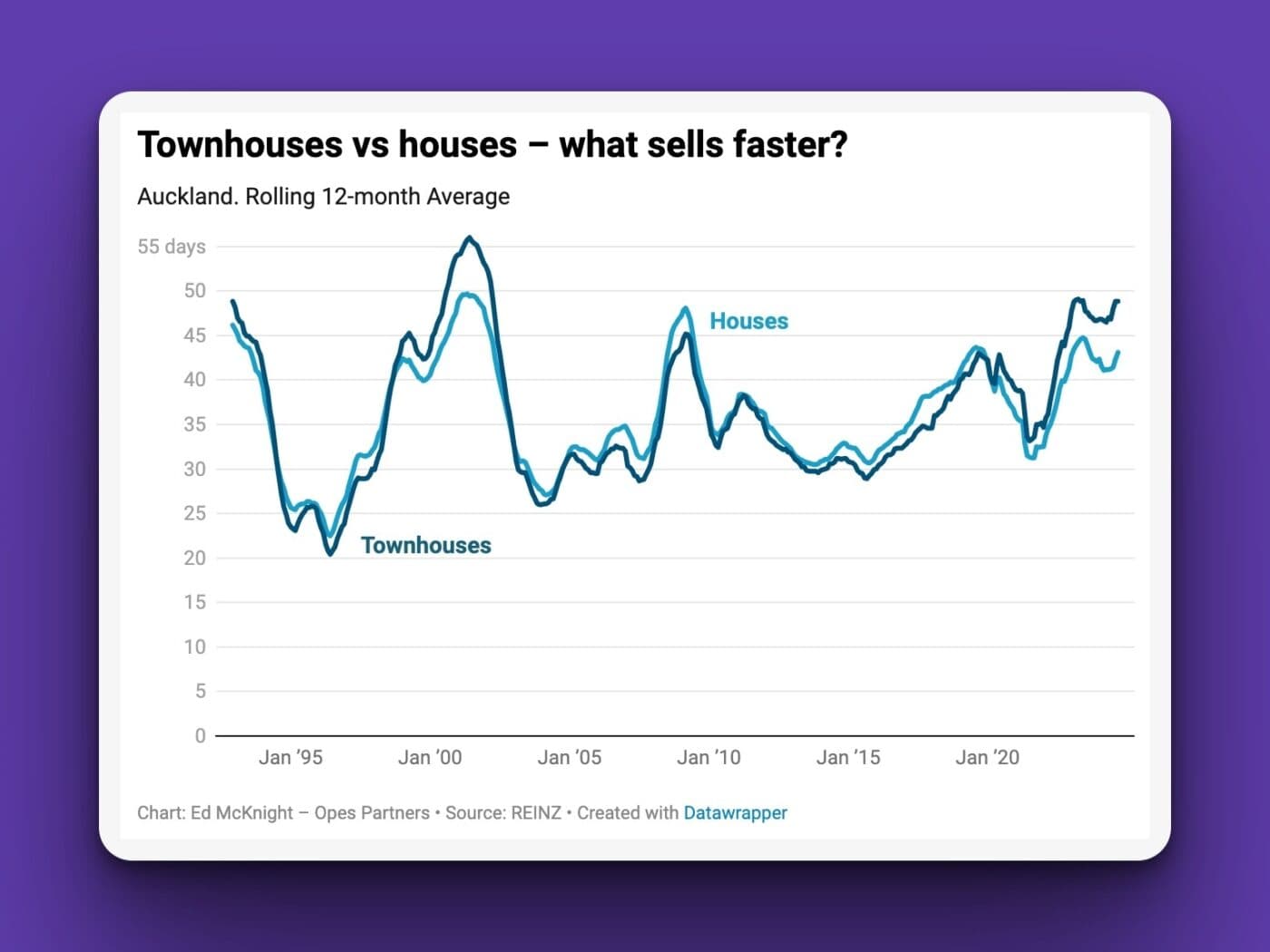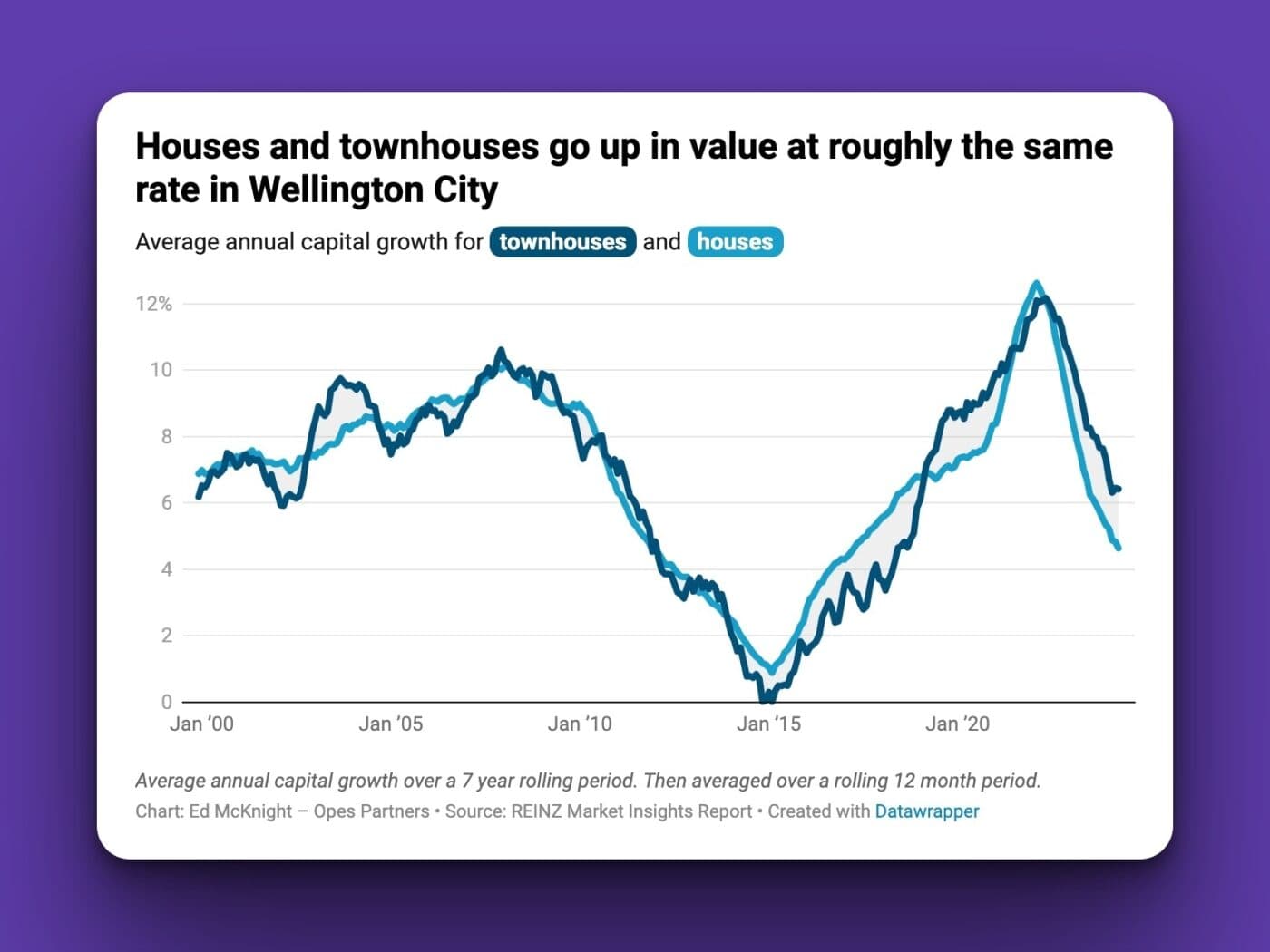
Property Types
Townhouses - Are they a good investment? An honest review
Thinking about investing in a townhouse? Here is an honest review of the pros and cons and whether this option is the right fit for your investment portfolio.
Property Investment
4 min read

Author: Andrew Nicol
Managing Director, 20+ Years' Experience Investing In Property, Author & Host
Reviewed by: Ed McKnight
Our Resident Economist, with a GradDipEcon and over five years at Opes Partners, is a trusted contributor to NZ Property Investor, Informed Investor, Stuff, Business Desk, and OneRoof.
If you’re thinking about buying an investment property you mustn’t fall into the ‘Townhouse Trap’.
The ‘Townhouse Trap’ is all the things people say about townhouses ... that aren’t actually true.
In this article, you'll learn what the ‘Townhouse Trap’ is, how to avoid it, and what to consider before buying.
Just before we get into it … you need to know that I own a company that often recommends New Build townhouses as investments.
So, you might be thinking, “He’s just going to tell me that townhouses are the best thing since sliced bread because he wants people to buy townhouses.”
I’m not going to do that. I’ve seen the good and the bad when it comes to townhouses, so I’m going to be as honest as possible ... the good and bad.
That way you can make up your own mind.
The ‘Townhouse Trap’ refers to common myths and fallacies about townhouses.
Remember, a fallacy is a flaw or error in reasoning. It might seem logically sound at first glance, but on closer examination, it fails to hold up.
Here are some of those common ‘Townhouse Traps’:
Some people believe townhouses take longer to sell.
The logic goes that:
But this argument doesn’t hold up if we look at historical data.
As far back as 1992, the median difference in selling time between houses and townhouses in Auckland is 0 days.

In some periods, townhouses sell slightly faster; in others, houses do. If we take the average, which can sometimes be more skewed, the difference is 5 hours.
Another common claim is that houses appreciate significantly faster than townhouses.
There are two common reasons for this:
The first is that land goes up in value; buildings don’t. So a property with more land will go up in value compared with properties that have less land.
The other argument is that when you go to sell your property it will be one of 20 identical units. Someone else in your development may be selling at the same time, and they could both be worth $550k.
And if that other seller in your development is desperate they might discount their price to $525k. Then other buyers use that to negotiate you down.
Competition can keep prices down. It sounds true, but the data tells a different story.
Houses appreciate slightly faster, but the difference can be marginal. In Wellington, the historical gap between townhouses and houses has been just 0.1% per year. In Auckland and Christchurch, it's been around 0.6%.

Why? Townhouses tend to be closer to city centres, where demand is higher.
A townhouse in a prime location can outperform a standalone house in a less desirable area.
Now, although you should avoid falling into the ‘Townhouse Trap’ that doesn’t mean everyone should buy one.
Here are some situations where buying a townhouse might not be the best choice.
Townhouses usually have smaller-sized lawns than houses.
So, if you want to bowl over a house and build properties … you’re not going to buy a townhouse.
Most townhouses are connected on both sides; you can’t demolish a townhouse to rebuild it.
A townhouse might not be ideal if your goal is to generate high-rental income.
Townhouses are growth properties, so they tend to grow in value faster, but they don’t earn as much rental income as a boarding house, a multi-tenant flat, or an apartment.
Some investors just aren’t comfortable with townhouses … and that’s OK.
If owning one would keep you up at night, it’s not the right investment for you.
You must be confident in your decision, especially since property is a long-term game.
So, that’s all the reasons not to buy a townhouse, but I’m still investing in them. Why?
Townhouses are cheaper than standalone houses.
For example, in Christchurch townhouses are about 22% cheaper than standalone houses.
This makes them more accessible to tenants, easier for investors to buy, and attractive to first-home buyers when it’s time to sell.
It also means you can invest in more expensive areas. For instance, the most expensive houses are in the Queenstown Lakes District. Down there, townhouses are much cheaper than buying an expensive house.
Townhouses appreciate faster than apartments and at a rate close to standalone houses.
An affordable property that appreciates at a similar rate to a house means I can diversify my investments. I can buy more properties around the country.
I’m not saying everyone should buy a townhouse. What matters most is your investment strategy.
A townhouse may not be the best fit if you want development potential or high rental yields.
But if you’re looking for a long-term investment, a townhouse can be a smart investment in a well-located area.
The key message is to be really careful of the ‘Townhouse Trap’. Some things sound true … but on closer inspection, they are simply myths (not backed by data).
Managing Director, 20+ Years' Experience Investing In Property, Author & Host
Andrew Nicol, Managing Director at Opes Partners, is a seasoned financial adviser and property investment expert with 20+ years of experience. With 40 investment properties, he hosts the Property Academy Podcast, co-authored 'Wealth Plan' with Ed Mcknight, and has helped 1,894 Kiwis achieve financial security through property investment.